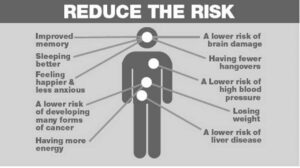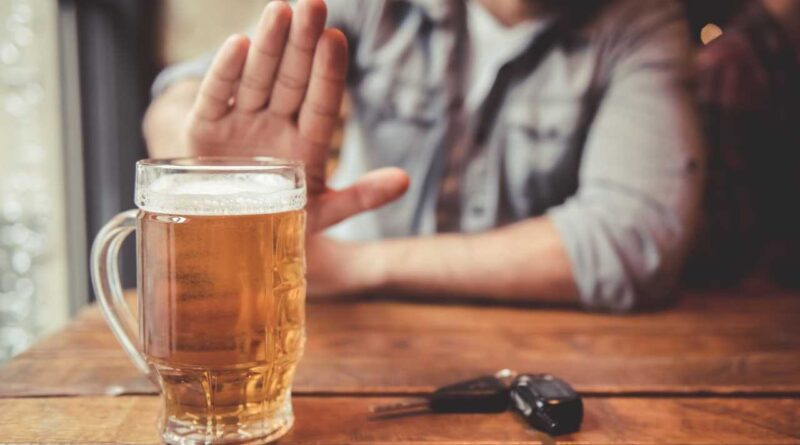Never too Late
 Benefits of cutting down or giving up Alcohol
Benefits of cutting down or giving up Alcohol
by Raquel Torres
Making a conscious decision to stop drinking alcohol involves making some major changes in your life. At a Glance Alcohol has many negative effects on physical and mental health. The benefits of quitting drinking are often apparent soon after you stop, and will only continue to improve the longer you abstain from drinking.
Quitting alcohol may even reverse some of the damage that alcohol can have on your body.
Is important that everyone keep in mind that quitting alcohol is a process, and it requires intentional strategies to reduce or eliminate it from your life.
Drinking too much alcohol can cause many unwanted effects on your health and well-being, some might think they can’t stop because they’re used to drinking for too long. In reality, it is never too late for you to stop and recover from drinking alcohol.
Over time, your body can begin to recover from the influence of alcohol, and you can expect: a healthier mind, body and a happier spirit.
 Why does quitting alcohol make us happier?
Why does quitting alcohol make us happier?
● The Brain gets stronger and more relaxed: “Going sober can significantly impact our happiness by altering the dopamine and serotonin levels in our brain,” explains certified sobriety coach Christy Osborne.
● Better memory, your memory will begin to improve. Alcohol is proven to hinder the part of your brain that deals with memory (the hippocampus)
● Better physical health, better immune system, you get “less sick”. Abstaining from alcohol enhances gut health, which is crucial for our overall well being. People who have been drinking a lot of alcohol for a long time tend to get frequent allergies, viruses, and infections like pneumonia and tuberculosis because their immune system has been worn down.
● Better sleep quality: sleep quality improves significantly when the person stops drinking. Alcohol consumption deprives of the vital REM sleep that our mind and body need. During REM sleep, the brain and body are energized and that is when you dream. REM sleep is considered to participate in the process of storing memories and learning and also helps balance your mood.
● Mindful and good mood, less stress, less drama, better relationships with the people you care about. This can mean:
1. More quality time together
2. Fewer arguments
3. The chance to bond over different activities
4. Less tension
● No more hangovers, waking up with a clear head and feeling energetic can be a welcome break. This will help you to make the most of your free time.
● More money, 1 in 3 people spend between $50 to $150 a week on alcohol. Depending on how much you drink, you could save a lot by cutting back.
● Better blood pressure, drinking too much alcohol can cause your blood pressure to rise over time. After 3-4 weeks of not drinking, your blood pressure will start to reduce.
Reducing your blood pressure can be crucial as it can help to lessen the risk of health problems occurring in the future.
● Weight loss, alcohol slows your metabolism, making it harder for your body to process fats and sugar. Snaking after drinks and junk food binges when you’re hungover can also lead to weight gain. Also most alcoholic drinks have almost the same calories per gram as pure fat, cutting back on alcohol will help you lose or keep a good weight.
● Better Skin, giving up alcohol will have a positive impact on the skin due to you having better levels of hydration. As more water will have been absorbed rather than wasted, you are likely to have more hydrated-looking skin, as well as reduced dandruff and eczema.
 What are some ways to reduce or stop drinking?
What are some ways to reduce or stop drinking?
For those who drink alcohol and want to cut back on your drinking, these four strategies can help; take some time to determine:
● Your Goals: What do you really want and why do you want it?
● Set limits: Decide how many days a week you plan to drink and how many drinks you plan to have. For instance, you might decide to only drink on a Friday night or Saturday night.
● Identify your Triggers: What are the people, places, and things that make you want to drink? Knowing your triggers can help you understand yourself better. Can you avoid these triggers, or do you have to try something different?
● If you need, find support. Ask for support from a friend, family member, healthcare provider, or someone else who will support your choice to drink less.
Being sober is not a hot-air balloon ride. It’s more like a hike in the mountains. Research shows that people who quit drinking connect more deeply with the people they care about, and no longer tolerate toxic patterns once they accept it as their due.
Reminding yourself of the many health benefits of sobriety can help you stay focused, reduce or end your drinking, and stay sober.
Raquel Torres, MBA es una USAT Elite Certified Coach, una Entrenadora de Triatlón y Triatleta Profesional. Raquel también escribe blogs para varias revistas y su equipo Athletic Mentors. Desde el mes de Mayo del 2021 contribuye como columnista con el periódico CNY Latino. Ella comparte consejos y tácticas para ayudar a otros a encontrar su mejor versión. Para leer acerca de ella, diríjase a cnylatinonewspaper.com y búsquela por su nombre. También puede enviarle preguntas ó comentarios sobre su columna al siguiente correo: raquel@athleticmentors.com y visitar su página web al www.raqueltorres.org
Athletic Mentors. Desde el mes de Mayo del 2021 contribuye como columnista con el periódico CNY Latino. Ella comparte consejos y tácticas para ayudar a otros a encontrar su mejor versión. Para leer acerca de ella, diríjase a cnylatinonewspaper.com y búsquela por su nombre. También puede enviarle preguntas ó comentarios sobre su columna al siguiente correo: raquel@athleticmentors.com y visitar su página web al www.raqueltorres.org

